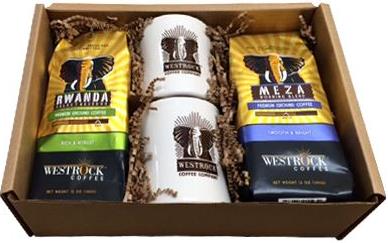Arkansas-Rwanda Coffee Blend

[media-credit name=”Westrock Coffee” align=”alignnone” width=”300″] [/media-credit]“Westrock Coffee links community to community. Our drive is to be a catalyst for real change in the lives of farmers and our families, through honest, direct trade with transparency at every stage in the supply chain from crop to cup. The end result is strong, sustainable growth at origin and a quality product for our customers.”
[/media-credit]“Westrock Coffee links community to community. Our drive is to be a catalyst for real change in the lives of farmers and our families, through honest, direct trade with transparency at every stage in the supply chain from crop to cup. The end result is strong, sustainable growth at origin and a quality product for our customers.”
Community to community, huh? That’s a literal understatement.
I stood in my little kitchen, barefoot on a winter afternoon, reading the label from my gifted gold bag of medium-roasted Meza coffee. “Meza” is a Kinyarwanda word for morning and so I knew this small bag was special – at least for me.
Grandpa and Glenda knew it would be too, and so I could sense their excitement building as I took a closer look. Read where it’s from, Glenda said, smiling.
I registered the fact that it was Rwandan coffee – and hey, that is certainly really cool – but when I realized the second half of the supply chain went through Little Rock, Arkansas, I gasped. WHAT?
I mean, I shouldn’t really be that surprised, considering all of the Arkansas-Rwanda connections floating around.
I was educated in Arkansas, lived for a while in Rwanda, and so connecting the two continually happens as I move through life. I notice it everywhere.
Bill Clinton is a big player in that connection.
But you also have people like Dale Dawson and his organization Bridge2Rwanda that equips brilliant young Rwandan minds to study abroad outside of Rwanda to avoid the “bottleneck” issue of Rwandan students who have no other place to develop their minds.
Dawson is the President, Founder-CEO, and divides his time between Kigali and Little Rock. Then, of course, you have the Presidential Scholars’ Program that is heavily operated in the state of Arkansas.
Both Hendrix College, the University of Arkansas, and a couple of other institutions seek and accept Rwandan students on full scholarship on an annual basis.
There’s a strange, continuous connection between these two places both rooted in my heart and I find that incredibly fascinating. Expressed on this little bag of greatness (ahem, coffee) brings even greater amazement of the linking of communities.
I was thrilled and couldn’t wait for a taste of this morning’s blend.
The three of us agreed, as we ate lunch and sipped our first cups, that the bold nutty aroma is smooth and fixating. The notes of sugary vanilla allow the sweetness to flow, but it’s beautifully subtle.
Glenda encouraged me to look into this. What’s behind the magical cup of so many intersections in my own life? What is the story and process and values of Westrock Coffee?
As an international company, the roasting and packaging are done in Arkansas, with trading desks in Europe, and original export facilities in Rwanda and Tanzania.
The bean is treated with care by the farmers in the harvesting, wet-milling, and early processing stages. Farmers are yielding double harvests from training and revenue is generated at a cooperative level through privately owned wet mills. Standards are applied in all phases – well before importing and roasting.
Still, the farmers’ capabilities and viability in the chain are respected and purposefully valued. Three specific stories of the farmers’ lives are even highlighted on Westrock’s website.
Perhaps that’s what makes the clear-nice finish in each cup. I’ve been saying all of this for some time. Coffee can change lives at the most important level – the micro-level.
That’s both selfless and selfish. This has the potential to change my own thinking(as a consumer), and it sure can change the producers’ too. This isn’t about growing and increasing simply for the sake of doing so. It’s sensible growth. It’s socially conscious. It’s a good business.
The blend of business and social advocacy – essentially social enterprise – is what really gets me going. I love it.
And I really love talking about it. To me, it’s one of the most dynamic and up-and-coming ways of creating change in the world for people who are incredibly capable of battling poverty.
I envision what it could look like in providing both purchasing and production power to people. The dignity that can be maintained; the growth that could occur in the context of the so-called “social enterprise”. It’s a beautiful mixture of non-profit sensibility with a sustainable business attitude. I think about all of these things and I get pumped.
